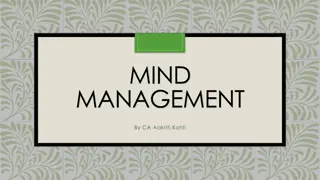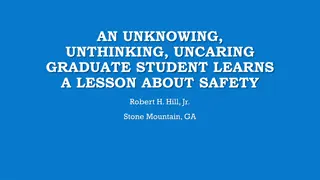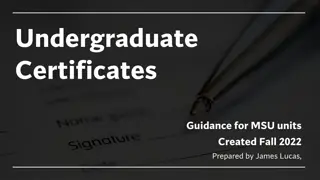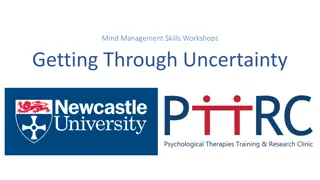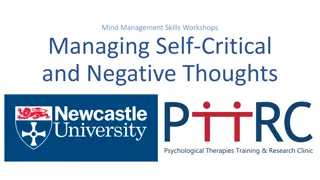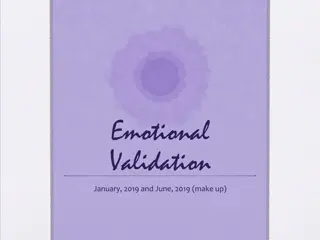Mind Management Skills Workshop for Undergraduate Students
Enhance your mind management skills to lead a balanced student life amidst university demands. Join interactive workshops tailored for students facing stress and emotional challenges, facilitated by Cognitive Behavioural Therapists and Clinical Psychologists. Gain insights into motivation, coping strategies, and access further support services as needed.
Download Presentation

Please find below an Image/Link to download the presentation.
The content on the website is provided AS IS for your information and personal use only. It may not be sold, licensed, or shared on other websites without obtaining consent from the author.If you encounter any issues during the download, it is possible that the publisher has removed the file from their server.
You are allowed to download the files provided on this website for personal or commercial use, subject to the condition that they are used lawfully. All files are the property of their respective owners.
The content on the website is provided AS IS for your information and personal use only. It may not be sold, licensed, or shared on other websites without obtaining consent from the author.
E N D
Presentation Transcript
Mind Management Skills Workshops Striking The Balance Mind management skills to help you lead a balanced student life in the face of university demands
PTTRC Mind Management Workshops Our clinic Psychological Therapies Training and Research Clinic data is required to help us develop these groups and understand what works Our roles: Cognitive Behavioural Therapists and Clinical Psychologists (and trainee clinicians) The purpose of these workshops to reach a greater number of students experiencing common emotional problems and stressors Based fully on the student voices and reports of what issues cause you distress Based on Cognitive Behavioural Therapy (CBT) Invitation to learn new skills and meet new people
Housekeeping Today s workshop will run for 90 minutes and is designed to be interactive we encourage participation Confidentiality you are not expected to share anything that you do not want to, however we do request that anything that is shared remains confidential and is not shared with any one else outside of the group Please be respectful of other group members who may choose to share their experiences maintain the confidentiality of the group
Further Support The workshops are designed to be skills-focussed, rather than problem-centred. However, if any of today s discussion or exercises cause you to experience distress, or you feel you need further support, you may wish to pursue further help Services: Accessing the Student Health and Wellbeing Service Listening services such as the Nightline and the Samaritans Evidence based therapy through NHS IAPT services (GP referral or self referral)
Why this workshop for undergraduate students? In our focus groups, undergraduate students reported to us they struggled to balance all of their university demands, e.g. studying, deadlines, socialising, hobbies etc, with this imbalance of time vs activity causing stress Struggles with motivation and procrastination
Goals for today Understand how we get caught in vicious cycles based on CBT principles The science behind motivation and what we can do about it Learn behavioural strategies/s based on evidence based CBT to schedule activities in a balanced way Identify behaviours within each area of activity that are important to you, and mechanisms to ensure a balance is executed and maintained Tips for procastination
What is CBT Cognitive: refers to the thoughts you have about yourself, other people and the situations/events that take place around you. Behavioural refers to what you do or don t do because of how you are thinking or feeling We will explore now how your thoughts, emotions and behaviours are interconnected and relate to situations/events you find yourself in. We call this the vicious cycle .
Vicious Cycle Unhelpful thoughts and behavioural responses to life s events happen all the time Depending on how the person responds to them, they can pass quickly or linger on, causing greater impact Vicious cycles can occur, between what we think, how we feel and what we do Thoughts, emotions and behaviours When these become unhelpful in response to a trigger, they can lead to difficulties with stress and other unwanted emotions (e.g. anxiety)
Vicious Cycle Trigger Thoughts Behaviour Emotions Psychological Therapies Training and Research Clinic; School of Psychology
Vicious Cycle Multiple Deadlines coming up for two modules this is too much, I cant do it, I haven t got the time Put of starting, watch TV Feel anxious, low, flat, fatigued Psychological Therapies Training and Research Clinic; School of Psychology
Understanding the Vicious Cycle Situation / Trigger 2 assignments due this month Thoughts There s too much to do, I can t cope, I wont do well Emotions Anxious, worried, down Physical Symptoms Tension, tired, nausea Behaviours Work long hours, cancel exercise class to work
Vicious Cycle Multiple Deadlines coming up for two modules oh my gosh, I have so much to do, how will I get it all done, I'm going to have to work every hour of every day Cancel all plans that week with friends, go to library 10am-10pm Feel anxious, on edge, nauseous Psychological Therapies Training and Research Clinic; School of Psychology
Vicious Cycle Deadline reached and assignment handed in. Return home That was exhausting, thank god its done, but probably have not done very well Rest for several days, do not commence nay other work or activity Feel relieved but tired, low, apprehensive Psychological Therapies Training and Research Clinic; School of Psychology
Over to you In small groups of 2 or 3, consider an example of a time that you felt overwhelmed, stressed, anxious or low in relation to a time you were too busy, overwhelmed, or your life felt out of balance. Consider: - What situation, event or trigger was happening at the time? (what was happening that meant I was too busy, overwhelmed etc) - What thoughts were going through your mind then, about the events? - How did those thoughts make you feel? (emotionally and/or physically) - How did the way you were feeling make you behave? What did you do at the time? - Were you in a vicious cycle?
The power of noticing Thinking something, and noticing that you are having a thought can be very different experiences Noticing your thoughts can help you to step back and reflect on what your mind is doing, rather than being embroiled in unhelpful thoughts Becoming aware of the thought Experiencing it less intensely Being aware of it without engaging fully in it Seeing it for what it is an event in your mind, rather than an objective fact This can allow us to respond differently to our vicious cycles Psychological Therapies Training and Research Clinic; School of Psychology
Behaviour Reinforcement The Science Behind Motivation Something rewarding, pleasant, or gratifying follows a behaviour (doing something to feel good or achieved) This increases the likelihood of the behaviour occurring again Positive Reinforcement Something unwanted or unpleasant reducing (a distressing feeling) goes away as a result of a behaviour (e.g. avoidance) Nothing bad happens imminently so this increases the likelihood of the behaviour occurring again Negative Reinforcement
The Science Behind Motivation Behaviours change certain behaviours are restricted = low levels of positive reinforcement Sad, stressed, anxious, low energy, Biochemical Changes Life events perceived to be negative/stressful Burnout Anxiety Problems Secondary coping Overworking, doing as much as possible Secondary coping avoiding, procrastinating Low mood Negative thoughts Adapted from Martell et al, 2001 Based on behavioural theory / operant conditioning i.e. + & - reinforcement
Motivation It can be easy to put things off because we aren t feeling motivated. Motivation is self-driven if we wait to just feel motivated it might not happen. We have to push ourselves to do things to build motivation back up The less we do The less we want to do The worse we feel The more we do The more we want to do The better we feel
Exercise Think of a time you have struggled with motivation and have been procrastinating Looking at the science behind motivation has this made you understand that event any better? Anyone willing to share?
Striking The Balance Types of Behaviour R N P ROUTINE - Day to day behaviour and activity e.g. getting up, washing, cleaning, cooking, eating, making bed etc etc NECESSARY Things that we must do, as if we don t do them they have consequences e.g. going to work/university, paying bills, completing assignments, handing assignments in to the deadline PLEASURABLE Things that we do which bring us joy e.g. spending time with friends, hobbies, phoning family, exercise/sports (could be necessary!), watching tv/films
Types of Behaviour Exercise using the handout, list as many behaviours as you can within each that you do/want to do R N P ROUTINE - Day to day behaviour and activity e.g. getting up, washing, cleaning, cooking, eating, making bed etc etc NECESSARY Things that we must do, as if we don t do them they have consequences e.g. going to work/university, paying bills, completing assignments, handing assignments in to the deadline PLEASURABLE Things that we do which bring us joy e.g. spending time with friends, hobbies, phoning family, exercise/sports (could be necessary!), watching tv/films
Keep your Boat Afloat Routine Pleasurable Necessary Martell et al, 2010
Consequences of no balance Routine Pleasurable Necessary Martell et al, 2010
Striking The Balance Activity Scheduling Balance of RNP across the week (psychologytools.com)
Tips for Activity Scheduling When feeling down, demotivated or engrossed in procrastination, the first move is always the hardest Jumpstart the car Try the 10 minute rule Break overwhelming tasks down into smaller parts and schedule the smaller parts Ensure there is a balance of RNP When attempting scheduled behaviours, follow the outside in principle The power hour (Laura s top tip!)
Exercise Activity Scheduling
Feedback Questions??
Summary When we feel overwhelmed by life events/situations, our behaviour starts to change Behaviour change usually has consequences on our emotional wellbeing and thoughts this becomes a vicious cycle A balance of routine, necessary and pleasurable activities in your day to life is pivotal to wellbeing At times you are overwhelmed, try activity scheduling with the top tips There is science behind motivation use it!
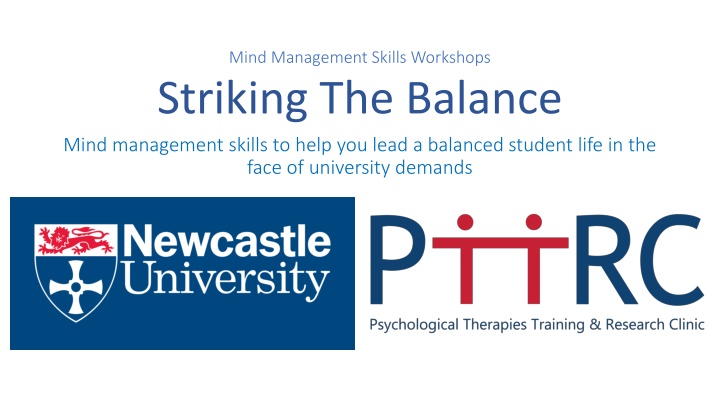


![[PDF⚡READ❤ONLINE] Zen Mind, Beginner's Mind: 50th Anniversary Edition](/thumb/20459/pdf-read-online-zen-mind-beginner-s-mind-50th-anniversary-edition.jpg)


